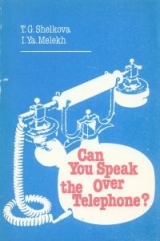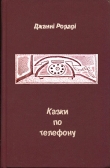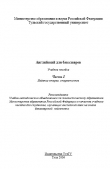
Текст книги "Как вести беседу по телефону"
Автор книги: Т. Шелкова
Соавторы: И. Мелех
Жанр:
Языкознание
сообщить о нарушении
Текущая страница: 2 (всего у книги 6 страниц)
II
TELEPHONE PHRASES
1. A: Hello!
B: May I speak to Mr Stock, please?
A: Speaking.
B: Good morning, Mr Stock. This is Surikov calling.
A: Good morning, Mr Surikov.
2. A: Hello.
B: Could I speak to Mr Ivanov?
A: Who’s calling, please?
B: This is Brown from the Foreign Office.
A: Thank you. I’m putting you through.
I: Ivanov speaking.
3. A: Soviet Embassy. Good morning.
B: Good morning. Could you put me through to Mr Sokolov?
A: Sorry. The line is engaged. Can you hold on?
B: All right. Thank you.
4. A: Five-seven-three; one-nine-oh-four.
B: Good evening. Can I speak to Mr Jones, please?
A: Sorry. Mr Jones is on the other line. Will you wait, please?
B: All right.
A: Sorry to have kept you waiting. I’m putting Mr Jones on the line.
B: Thank you.
5. A: Hello.
B: Hello. David Black speaking. May I have a word with Mr Ivanov?
A: I’ll see if he is in. (A minute later.) I’m afraid Mr Ivanov is out at the moment.
B: Could you take a message?
A: Yes, of course.
6. A: Hello. This is Petrov from the Soviet Trade Delegation. Could you put me through to Mr Russell, please?
B: Hold on a moment, please. Sorry. Mr Russell is not in now and he won’t be back until late this afternoon.
A: Would you ask him to call me when he gets back? B: Certainly.
7. A: Hello. May I speak to Mr Roberts?
B: Sorry, sir. Mr Roberts is not available. Is there any message?
A: No, thank you. I’ll call back later.
B: Right. Good-bye.
8. A: Hello. May I speak with Mr Black for a minute?
B: Hold the line, please.
A: Thank you.
B: Sorry. There is no reply at his number.
9. A: Foreign Office. Good afternoon. Can I help you?
B: Good afternoon. I’d like to speak to Mr Tate.
A: What extension, please?
B: I think it’s twenty three.
A: Thank you. (After a moment.) You are through.
10. A: Good morning.
B: Good morning. May I have extension thirty-two, please?
A: Busy. Will you hold on, please?
B: Yes. Thank you.
11. A: Good morning. May I speak to Mr Parsons?
B: Mr Who?
A: Parsons: P-a-r-s-o-n-s.
B: Oh, I see. Mr Parsons. I thought at first you said Marshall. Could you give me your name, please?
A: Yes, Stogov. S – for sugar, T – for Tommy, О – for orange, G – for George, О – for orange, V – for Victor.
B: Thank you, Mr Stogov. Trying to connect you.
12. A: Three-four-five; eight-double seven-nine.
B: Can I speak to Mr Scott?
A: I’m afraid you’ve got the wrong number.
B: Oh, sorry to have troubled you.
A: That’s all right.
13. A: Hello. I’d like to talk to Mr Smith.
B: I’m afraid you have the wrong number. What number were you calling?
A: I was calling 340-1907.
B: This is 340-1907. But there is no one by the name of Smith here. This is a private residence.
A: I’m sorry to have bothered you.
B: That’s quite all right.
14. A: I’m sorry. I can’t hear what you are saying. Could you speak up, please?
B: Hello, hello… Are you there?
A: Your voice is fading and there’s some background noise interfering. Hello, hello… (No reply.) Operator, we had a very bad connection and could scarcely hear each other. Then we were cut off completely. Could you help us?
Operator. Yes, sir. I’ll try to do something about it.
15. A: International. Good evening.
B: Good evening. I want to book a call to Moscow for 10 p.m. My name is Grachev.
A: Good. What number are you calling from?
B: It’s 843-1227.
A: What number do you want in Moscow?
B: 244-40-90.
A: Would you like to make it personal?
B: No. I just want a station-to-station call.
A: Thank you.
16. A: Number, please.
B: 437-8181. Can I have a personal call to Manchester 645-9302 with ADC, please?
A: Will it be on credit?
B: Yes, it will.
A: Who are you calling?
B: Mr Kapp.
A: Your number, please?
B: 01-193-4005.
17. A: I’m terribly sorry that you have been disconnected. I’ll try to connect you again. (After a moment.) There seems to be some interruption in our connection with Chicago. I’ll call you back as soon as there is another circuit open.
B: Will it take very long?
A: It’s hard to say. I’ll keep working on your call and ring you as soon as I have your party again. It shouldn’t be more than ten or fifteen minutes.
B: Thank you. I’ll wait for your call.
18. A: Hello. I’m wondering if you could help me. I’ve been dialling 340-1908 for the past hour but I can’t get through.
B: One moment, please. I’ll check the line. (After a moment.) You are through now, sir. Go ahead, please.
A: Thank you.
WORDS AND PHRASES
1. Speaking. Слушаю.
This is Surikov calling. Говорит Суриков.
2. Who’s calling, please? Кто говорит (звонит)?
3. Could you put me through to Mr Sokolov? Вы не могли бы соединить меня с г-ном Соколовым?
I’m putting you through. (I’m ringing your party now.) Соединяю.
Ivanov speaking. Говорит Иванов.
The line is engaged. Номер занят.
Can you hold on? Вы можете подождать?
4. Mr Jones is on the other line. Г-н Джоунз разговаривает по другому телефону.
Sorry to have kept you waiting. Извините, что я заставил вас ждать.
I’m putting Mr Jones on the line. Передаю трубку г-ну Джоунзу.
5. I’ll see if he is in. Я сейчас посмотрю, у себя ли он.
Mr Ivanov is out at the moment. Г-на Иванова сейчас нет.
Could you take a message? (Could I leave a message?) Вы не могли бы передать ему мою просьбу?
6. Hold on a moment, please. Подождите минутку, пожалуйста.
Не won’t be back until late this afternoon. Он будет только в конце дня.
7. Mr Roberts is not available. Г-на Робертса нет.
Is there any message? Что-нибудь передать ему?
I’ll call back later. Я позвоню еще раз позже.
Right.Br. Хорошо.
8. Hold the line, please. He кладите трубку, пожалуйста. (Подождите, пожалуйста.)
There is no reply (answer) at his number. Его номер не отвечает.
9. What extension, please? Добавочный, пожалуйста.
You are through. Вас соединили.
10. May I have extension thirty-two, please. Соедините меня, пожалуйста, с добавочным 32.
11. Trying to connect you. Соединяю.
12. You’ve got the wrong number. Вы ошиблись номером.
Sorry to have troubled (bothered) you. Простите за беспокойство.
13. There is no one by the name of Smith here. Здесь нет никого по фамилии Смит.
This is a private residence. Это частная квартира.
I’m sorry to have bothered you. Извините за беспокойство.
That’s quite all right. Пожалуйста.
14. Could you speak up, please. He могли бы вы говорить громче?
Are you there? Вы меня слышите?
Your voice is fading and there’s some background noise interfering. Ваш голос исчезает, и появляется какой-то шум.
We had a very bad connection. Было очень плохо слышно.
We could scarcely hear each other. Мы почти не слышали друг друга.
Then we were cut off completely. А затем нас вообще разъединили.
15. I want to book a call to Moscow for 10 p. m. (I want to place a call at Moscow for 10 p. m.) Я хочу заказать разговор с Москвой на 10 часов вечера.
What number are you calling from? С какого номера вы звоните?
Would you like to make it personal?Br. (Would you like to make it person-to-person? Am.) Вы хотите вызвать определенное лицо?
I just want a station-to-station call. Соедините меня просто с абонентом.
16. Will it be on credit? Br. (Is it a credit card call? Am.) Вы заказываете разговор в кредит?
17. I’m terribly sorry that you have been disconnected. Извините, что вас разъединили.
There seems to be some interruption (interference) in our connection with Chicago. Вероятно, прервалась связь с Чикаго.
I’ll call you back as soon as there is another circuit open. Я вам позвоню, как только освободится другая линия.
I’ll ring you as soon as I have your party again. Я позвоню вам, как только ответит ваш номер.
18. I can’t get through. Я не могу дозвониться.
Go ahead, please. Говорите, пожалуйста.
The Most Common Words Used When Spelling Names on the Phone
A – APPLE
В – BEN
С – CHARLY
D – DONALD
E – ENGLAND
F – FREDDY
G – GEORGE
H – HARRY
I – INDIA
J – JANE
К – KATE
L – LONDON
M – MOTHER
N – NICHOLAS
Q – QUEEN
R – ROGER
S – SUGAR
T – TOMMY
U – UNCLE
О – ORANGE
P – PETER
V – VICTOR
W – WARM
X – X-RAY
Y – YELLOW
Z – ZEBRA
EXERCISES
I. Read the flashes of telephone conversations and pay attention to telephone phrases.
II. Rehearse these dialogues in pairs.
III. Find equivalents in these dialogues for the following sentences.
1. Говорит Суриков. 2. Соединяю. 3. Говорит Иванов. 4. Вы не могли бы соединить меня с г-ном Соколовым? 5. Номер занят. 6. Г-н Джоунз разговаривает по другому телефону. 7. Извините, что я заставил вас ждать. 8. Г-на Иванова сейчас нет. 9. Подождите минутку, пожалуйста. 10. Я позвоню еще раз позже. 11. Его номер не отвечает. 12. Добавочный, пожалуйста. 13. Добавочный 32, пожалуйста. 14. Занят. 15. Вы ошиблись номером. 16. Простите за беспокойство. 17. Здесь нет никого по фамилии Смит. 18. Извините за беспокойство. 19. Вы меня слышите? 20. Все время появляется какой-то шум. 21. Мы почти не слышали друг друга. 22. Нас разъединили. 23. Я хочу заказать разговор с Москвой на 9 часов вечера. 24. Вы хотите вызвать определенное лицо? 25. Вы заказываете разговор в кредит? 26. Я вам позвоню, как только ответит ваш номер. 27. Я не могу дозвониться. 28. Говорите, пожалуйста.
IV. Fill in the missing remarks.
1. A: May I speak with Mr Bell?
B: …
A: Could I leave a message for him?
B: …
2. A: Is this 347-5166?
B: …
A: This is Buchnev from the USSR Embassy.
B: …
3. A: Messrs. Smith O Son Ltd. Good morning.
B: …
A: Sorry. The line is busy.
4. A: Sorry. Mr Foot is on the other line. Will you hold on, please?
B: …
5. A: …
B: I’ll call back later.
6. A: Sorry to have kept you waiting. Now I’m putting you through.
B: …
7. A: Is there any message?
8. A: …
B: Hold on, please. I’ll see if he is in.
9. A: Sorry. Mr Bradley is not available. Would you like to leave a message?
B: …
10. A: Sorry. There is no reply at his number.
11. A: May I have extension 75, please?
B: …
A: Well, yes, if it doesn’t take too long.
12. A: I’m sorry. I didn’t catch your name. Will you spell it, please.
B: …
13. A: You’ve got the wrong number.
B: …
A: That’s all right.
14. A: …
B: This is 520-4824. But there is no one by the name of Scott here.
15. A: Hello, hello… I can’t hear what you are saying.
B: …
16. A: Operator, I’ve been disconnected with my caller. Could you help me?
O: …
17. A: I want to place a call at Leningrad.
O: …
A: 274-20-18.
O: Is it a credit card call?
A: …
18. O: Would you like to make a person-to-person call?
A: …
19. O: Will you accept a collect call from Mr Dowden?
A: …
20. A: There appears to be some interference in our connection with Moscow. Could you do anything about it?
O: …
V. Spell the names on the phone.
Костиков, Рязанов, Орлов, Ордынский, Соловьев, Бардин, Соколов, Иванов, Дарский, Кружковский, Петров, Бучнев.
III
TOPICAL TELEPHONE CONVERSATIONS
A. APPOINTMENTS
1. Making an Appointment
Secretary: Two-four-nine; double eight-double two.
Mr Ivanov: I would like to make an appointment with Mr Jeffries. This is Mr Ivanov speaking.
Secretary: Oh, yes, Mr Ivanov. Good morning. I’ll get his schedule. Are you there?
Mr Ivanov: Yes.
Secretary: When would you like to come, Mr Ivanov?
Mr Ivanov: Tomorrow, if possible.
Secretary: I’m afraid he’s tied up tomorrow. Is it urgent? If it is, perhaps we could fit you in somewhere.
Mr Ivanov: No, it isn’t that urgent. Is the day after tomorrow possible?
Secretary: What time would you like to come?
Mr Ivanov: As late as possible in the afternoon.
Secretary: I’m sorry, that afternoon’s full too. How is Friday afternoon at five?
Mr Ivanov: Yes, that’s perfect, thank you. Good-bye.
2. Making an Appointment
Mr Zonov: Hello. Is this Mr Summerset? This is Mr Zonov speaking.
Mr Summerset: Hello. How are you?
Mr Zonov: Fine, thanks. Pretty busy. How are you, Mr Summerset?
Mr Summerset: O.K. I can’t complain.
Mr Zonov: Glad to hear that. There is something I’d like to talk to you about. Can we meet early next week?
Mr Summerset: Sure, with pleasure.
Mr Zonov: Could you come in my office, say, on Monday afternoon?
Mr Summerset: Let me consult my schedule. Yes, I guess it’ll be all right. What time do you suggest?
Mr Zonov: Suppose we make it 3.30. Will it suit you?
Mr Summerset: Yes, that’s fine.
3. Making an Appointment with a Secretary
Mr Petrov: Hello. May I speak to Mr Ward, please?
Mr Ward: Speaking. Who is it, please?
Mr Petrov: Good morning, Mr Ward. This is Petrov, Mr Gromov’s assistant. Mr Gromov had to fly to Chicago on urgent business last night. He could not see you personally and so he asked me to get in touch with you instead and settle the matter you discussed.
Mr Ward: Sure, Mr Petrov. I’ll tell you what. Could you come over to my office, say, about 4 o’clock? Mr Petrov: Yes, that’s fine for me, Mr Ward. I’ll be there.
Mr Ward: O.K., I’ll be expecting you. And I can give you a ride afterwards.
4. Appointment with a Doctor
Mr Nikolaev: Is that Dr Morton’s office?
Secretary: Yes, sir.
Mr Nikolaev: This is Nikolaev speaking. Could I have an appointment with the doctor in the middle of next week, please?
Secretary: Just a minute, sir: I’ll check his schedule. Will Wednesday be all right?
Mr Nikolaev: Yes, it’s fine. What time, please?
Secretary: Wednesday, at 6 p.m.
Mr Nikolaev: Thank you. Good-bye.
Secretary: Thank you, sir. Good-bye.
5. Appointment with a Dentist
Mr Nikolaev: Good morning. Could I speak to Dr Williams’ secretary, please?
Secretary: Speaking.
Mr Nikolaev: My name is Nikolaev. I would like to have an appointment with the doctor.
Secretary: Is it something urgent, sir?
Mr Nikolaev: Yes, rather. My son needs a dentist.
Secretary: I see. How old is he?
Mr Nikolaev: He is about eight.
Secretary: Can you bring him tomorrow at eleven?
Mr Nikolaev: That’s Thursday, isn’t it?
Secretary: Yes, sir.
Mr Nikolaev: That’s fine. Thank you very much.
Secretary: Good-bye.
6. Confirming an Appointment
Secretary: Hello. May I speak to Mr Smirnov, please?
Mr Smirnov: Smirnov speaking.
Secretary: Mr Smirnov, this is Mr Abbott’s secretary. I’m calling to confirm your appointment with Mr Abbott for next Friday at 4 p.m.
Mr Smirnov: Thank you. I’m looking forward to seeing Mr Abbott next Friday. Will you give him my best regards, please.
Secretary: I will. Good-bye, Mr Smirnov.
Mr Smirnov: Good-bye.
7. Being Unable to Keep an Appointment
Mr Stunns: Hello. Could I speak to Mr Ivanovo secretary, please?
Secretary: Good morning. This is Mr Ivanov’s secretary.
Mr Stunns: This is Stunns, of the Ministry of Transportation. I would like to know whether Mr Ivanov has received an invitation to our Annual Meeting?
Secretary: Yes, Mr Stunns, we have received your invitation, thank you.
Mr Stunns: Is Mr Ivanov coming?
Secretary: No, Mr Stunns, he is not. I am sorry but Mr Ivanov left town and he won’t be back until next week. Haven’t you received our letter informing you that he is not attending the Meeting?
Mr Stunns: No, not yet.
Secretary: We sent it to the Department yesterday afternoon.
Mr Stunns: It’s a pity that Mr Ivanov is not able to be present at our Annual Meeting. Give him my best regards when he returns, please.
Secretary: Thank you, I will. Good-bye.
Mr Stunns: Good-bye.
8. Calling the Maintenance Department
M.D.: Maintenance Department.
Customer: I would like to report the fault of my phone to the operator.
M.D.: What’s wrong with it? Is it quite dead?
Customer: No, not quite. I can’t get a call through. I hear the voice on the other end of the line, but they seem not to hear me. And there is no proper buzz.
M.D.: From where are you talking now?
Customer: From my neighbour’s phone.
M.D.: Give me your neighbour’s telephone number and your own phone number, please. (Customer tells the maintenance clerk his neighbour’s and his own telephone numbers.) Thank you. I’ll get in touch with the switchboard, and call you back. (The telephone rings up in five minutes.) This is the Maintenance Department. Eight-four-two; double three-double two is out of order. We are sending a repair-man tomorrow morning. Sorry, we cannot do anything now. Good-bye.
EXERCISES
I. Read these dialogues and pay attention to telephone phrases.
II. Reproduce these dialogues as close to the text as possible.
III. Practise spelling different names over the telephone.
IV. What would you say in reply to these remarks?
1. This is Mr Slow speaking. I would like to make an appointment with Mr Gorelov. 2. I’m afraid I’ll be tied up tomorrow. Could you suggest an alternative date? 3. There’s something I’d like to talk to you about. When can we meet? 4. I’m afraid we cannot fit you in today but we could recommend you another dentist. 5. This is Mr Fray’s secretary. I’m calling to confirm your appointment with Mr Fray for tomorrow, at 10 a.m. 6. I’m calling to let you know that Mr Bell will not be able to keep the appointment. He is away from London and won’t be back until after Wednesday. We are sorry about this.
V. In what situations would you say the following?
1. Sorry, we cannot fit you in today. 2. Let me consult my schedule. 3. Could you give me an alternative date? 4. I’m afraid Mr Petrov will not be able to keep the appointment. 5. Could I make an appointment with the dentist? 6. I can give you a lift afterwards. 7. We’ve made an appointment for Wednesday tentatively. 8. I’m calling to confirm your appointment with my colleagues. 9. We’re looking forward to seeing you next Sunday. 10. I’d like to report the fault of my phone. 11. The line is completely dead.
VI. a) Make an appointment by phone:
1. with your counterpart; 2. with a doctor; 3. with an engineer from the T.V. repair service; 4. with a dentist; 5. with a friend of yours; 6. with Mr Brody, Sales Manager of a big company.
b) Confirm the appointment by phone.
c) Phone Mr Slow and tell him that you are unable to keep the appointment and give your reason.
Working in groups of two, read the following dialogues aloud.
Dialogue 1
9. A Visit of Diplomats
The Protocol Department arranged a visit of diplomats accredited at Moscow to the Cardiological Centre of the Ministry of Public Health. Here is a talk between a Soviet official and an Australian diplomat concerning the details of the visit.
Mr Ward: Good morning. This is Ward of the Australian Embassy speaking.
Mr Orlov: Good morning, Mr Ward. Orlov speaking. Can I be of any help to you?
Mr Ward: I am calling to confirm our visit to the Moscow Cardiological Centre. Any changes in the schedule of the visit, Mr Orlov?
Mr Orlov: No changes so far. The visit is arranged for the heads of staff and other members of foreign missions and embassies in Moscow.
Mr Ward: The date and time remain as mentioned in the memo?
Mr Orlov: Yes, next Tuesday, 11 a.m.
Mr Ward: Thank you. Are we supposed to go to the Cardiological Centre on our own?
Mr Orlov: No, Mr Ward, we invite you to come to the Foreign Ministry first, and then we’ll proceed to the Centre in buses.
Mr Ward: That’s a good idea. Any chance of seeing you, Mr Orlov, at the Ministry?
Mr Orlov: Of course, I’ll be accompanying you to the Cardiological Centre.
Mr Ward: Fine. See you next Tuesday, then. Good-bye.
Mr Orlov: Good-bye, Mr Ward.
WORDS AND EXPRESSIONS YOU MAY NEED
to call to confirm звонить по телефону для того, чтобы подтвердить
to arrange a visit организовать посещение
proceedv зд. продолжить путь
EXERCISES
I. Summarize the dialogue in a talk of 2-minutes duration.
II. Make arrangements through the Protocol department over the phone about a visit of Soviet diplomats to the English parliament or the US Congress.
Dialogue 2
At the Cardiological Centre
The General-Director of the Centre: Good morning, ladies and gentlemen. You are welcome to our institution.
A voice: As guests or as patients?
The Director: As guests, of course.
First Secretary of the US Embassy: Will you kindly tell us a few words about your celebrated establishment, sir?
The Director: The Centre was constructed in 1975 with money raised by Soviet people through voluntary work during a Communist Subbotnik.
Second Secretary of the Mexican Embassy: Without any subsidies from the Government?
The Director: No subsidies from the Government. The Centre comprises three institutes of Clinical Cardiology, the Experimental Cardiology and the Institute of Heart Disease Prevention.
The Indian Ambassador: We presume that the medical personnel is staffed with experienced scientists?
The Director: Not only. A quarter of the Centre’s scientific staff of 500 are young researchers.
The First Secretary of the Ecuadorian Embassy: All equipment and medicines you are using here is of Soviet manufacture?
The Director: Not necessarily. We have scientific exchange agreements with a number of foreign countries and they supply us with some of their advanced equipment.
Counsellor of the Chinese Embassy: Cardiovascular diseases are known to affect people of all ages, especially the elderly. Do you work out recommendations for the people of this group?
The Director: Yes, we study the causes and focus the attention on heart disease prevention.
Ambassador of Nigeria: From what we see here it’s obvious that your Government considers people’s health a matter of state importance. Do you share your rich experience in this field with the less developed countries?
The Director: Yes, we do. Apart from the theoretical aspect of research and the results of the experiments which are open to any state, we helped in equipment of hospitals in some countries.
Ambassador of Ecuador: Namely?
The Director: In Ethiopia, Angola, India, to mention only a few.
Ambassador of Madagascar: I think that the Cardiological Centre is a spectacular example of the great attention your Government is paying to public health.
First Secretary of the US Embassy: Somebody asked at the beginning of our visit whether you, sir, welcome us here as your guests or patients. I for one don’t mind if I ever have a heart attack to be admitted to your Centre as a patient.
The Director: I am sure you won’t have it.
The Ambassador of the People’s Republic of Bulgaria: Allow me, sir, on behalf of the diplomatic corps and on my own behalf to express genuine satisfaction with the results of our visit to the Centre. We wish the staff of the Centre further success for the benefit of mankind. Thank you.
The Director: Thank you, ladies and gentlemen. The pleasure is ours.
Good-bye.
The guests: Good-bye.
WORDS AND EXPRESSIONS YOU MAY NEED:
money is raised деньги собраны
voluntary work добровольный труд
cardiovascular diseases сердечно-сосудистые заболевания
disease prevention предупреждение болезней
to share rich (positive) experience делиться богатым (положительным) опытом
a spectacular exampleзд. наглядный пример
genuine satisfaction искреннее удовлетворение
Interpretation dialogue. Working in pairs, read the following conversations:
Two young diplomats, Soviet and American, both members of their respective delegations to the General Assembly of the United Nations, meet in the lobby of the U.N. Secretariat in New York. Among other questions, they talk about the foreign services of their countries and prominent Soviet and American diplomats.
Mr Briggs: So you’ve crossed the Atlantic to come to New York again, Mr Artov.
Mr Artov: Yes, I have. Among other things separating us is the Atlantic Ocean. You’re lucky, Briggs. It takes you only two hours to get to New York, whereas I have to fly here for more than fifteen hours.
Mr Briggs: You can afford it once a year. I wish I could travel to Moscow at my government’s expense.
Mr Artov: Who heads the American delegation at this G.A.?
Mr Briggs: This time it is a lady, an old friend of the President.
Mr Artov: Democrat or Republican?
Mr Briggs: Republican, of course. She is a professional diplomat. Do you have women-diplomat in your foreign service?
Mr Artov: Yes, we have. A woman-diplomat once headed our UN mission to the Geneva headquarters.
Mr Briggs: Are there any women-ambassadors?
Mr Artov: Not now. Prior and during the war Mrs Alexandra Kollontay was our ambassador in Sweden.
Mr Briggs: This is very interesting. Tell me about her.
Mr Artov: Mrs Kollontay was the first woman to become an accredited diplomat to a foreign country.
Mr Briggs: I guess she was a contemporary of Lenin?
Mr Artov: Yes, she was. Kollontay was an active revolutionary in tzarist Russia.
Mr Briggs: Did she take part in any international conferences?
Mr Artov: She conducted the Soviet-Finnish armistice in 1944.
Mr Briggs: We, in the States, too, have a couple of ladies occupying high posts in the State Department. I’m afraid they are not so prominent as Mrs Kollontay.
Mr Artov: If I am not mistaken, Mrs Lewis was US ambassador in Italy. Where is she now?
Mr Briggs: She has retired already.
Mr Artov: Since when?
Mr Briggs: Oh, years ago. The American permanent delegation to the UN is headed by a lady now.
Mr Artov: Mrs K.?
Mr Briggs: Yes, do you know her?
Mr Artov: Not personally. She seems to be very active, doesn’t she?
Mr Briggs: I think the State Department makes her that active. She is a well-educated person, though. She is an official who tries to do her best to carry out orders she gets from above.
Mr Artov: I should think so. One of the American newspapers called her “a militant lady”.
Mr Briggs: Our press writes a lot about her. The other day I read an article in the “Readers’ Digest” where she is considered to be “undiplomatic ambassador of the USA”.
Mr Artov: Not very complimentary. A diplomat should be diplomatic, at least to justify the name.
Mr Briggs: The break is over, let’s go to the Assembly Hall.
Mr Artov: Off we go, Briggs.
EXERCISES
I. Hold a class discussion on the diplomatic aspect of the activity of the United Nations.
II. State the arguments (if any) for and against the employment of women as professional diplomats.
III. Summarize the conversation of the two diplomats in a talks of 5-minutes duration.








